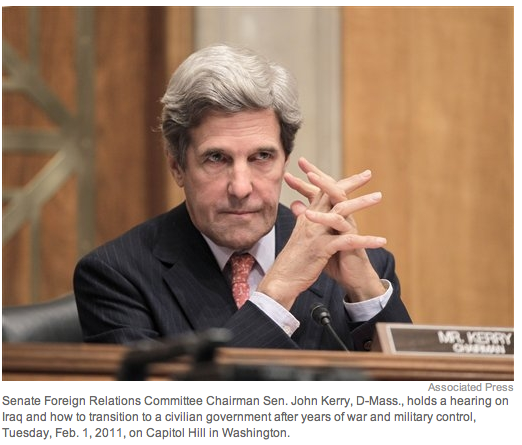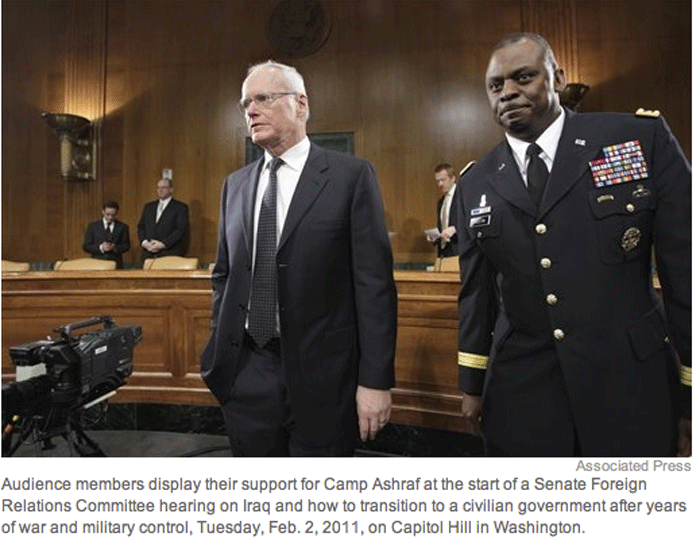Senate Ponders Iraq 2012
This is the latest in our Iraq 2012 series
02/18/2011 – As Robbin Laird and Ed Timperlake note, there has been little Western commentary about how events in Tunisia and Egypt are affecting developments in Iraq. Yet, there have already been some protests in Iraq calling for an Egyptian-style revolution, while Prime Minister Nouri al-Maliki declared his intent not to run for reelection, seeking to downplay fears that he aims to become another Arab dictator. In a pair of recent congressional hearings on Iraq, several Senators echoed the call of Laird and Timperlake to “build from the moral authority of the Iraq engagement which is a force for good in demonstrating a fundamental re-shaping the Arab world and the Western involvement in that world.” But most of the debate focused on the practical issues involved in transitioning from a mission led by the well-resourced Defense Department to one under the supervision of the less abundant State Department.
John Kerry, chairman of the Senate Foreign Relations Committee, began its February 1 hearing on Iraq by observing that, “Now before we get started this morning I just want to say one thing about the events that are now taking place in the Middle East. We are witnessing an historic moment in the Middle East, and it is impossible to predict exactly what lies ahead. But clearly, whatever transpires, it is going to have a profound impact, a huge influence on the region and on American foreign policy in that region for years to come.” Kerry promised to hold hearings dedicated to assessing this topic — something SLD will watch closely.

A focus of the February 1 hearing and that of the Senate Armed Services Committee, which occurred on February 3, chaired by Senator Carl Levin was whether American combat troops should remain in Iraq after the end of this year to maintain order if the new Iraqi government made such a request. The Senators generally agreed with Kerry about the need to balance any U.S. civilian and military commitment with the resources approved by the Congress and the support offered by the Iraqi government — but they were divided on where that balance should fall. On the one hand, some Senators implied that it was likely that the United States would need to keep some military forces in Iraq after this year. They pressed the two star witnesses — James F. Jeffrey, Ambassador To Iraq, and General Lloyd James Austin, Commanding General, United States Forces-Iraq — to agree with this assessment.
But these senior U.S. civilian and military heads in Iraq, noting that the United States has signed a legally binding agreement to withdrawal all U.S. troops from Iraq by the end of this year and that, except perhaps in Iraqi Kurdistan, less than one out of ten of the 27 million Iraqis would favor a permanent U.S. military presence in their country — declined to do so. Instead, Ambassador Jeffrey and General Austin said only that they would support a continued mission if their Iraqi and U.S. superiors decided on that course of action. On the other hand, many Senators felt comfortable with the timetable developed during the George W. Bush administration and subsequently confirmed during the current Barack Obama administration that would see the focus shift from a military effort led by the Defense Department to a civilian-led engagement under the leadership of the State Department and the Baghdad Embassy.
Under the new arrangements, the United States Forces-Iraq (USFI), currently a force subordinate to Central Command, will confine its role primarily to that of advising, training, assisting, and equipping Iraqi military forces for the next few months. The U.S military would then conduct any further efforts along these lines as a security advisory and training assistance program under Title 22 authorities subordinate to the U.S. Embassy in Baghdad. The USFI Training and Advisory Mission is focusing more on “train- the-trainer” programs so that the Iraqi Ministries of Defense and Interior can lead the overall training effort. One concern regarding this transition was that the resulting diplomatic mission, in Kerry’s words, “will be of unprecedented size and complexity.” The Department of State will assume responsibility for a number of Department of Defense (DoD) missions that it has never done before. The U.S. Embassy in Baghdad, the largest in the world, will have under its authority some 17,000 people at about 15 different sites. These locations, which are all located inside Iraqi military bases, include three air hubs, three police training centers, two consulates, two embassy branch offices, and five Office of Security Cooperation sites.
Almost all these 17,000 personnel will be contractors, including some who will provide perimeter and movement security for American diplomats. U.S. and Iraqi authorities have studied the problems that have arisen in Afghanistan with contract personnel and are determined to avoid them. The American security personnel are required to register with the Iraqi authorities and follow their regulations and laws. The personal security contractors also come under the direct supervision of the small number of U.S diplomatic security personnel, who are full-time U.S. government employees. Civilian police trainers belonging to the State Department will replace the current DoD trainers at the Iraqi police academy, now called FOB Shield. The current Provisional Reconstruction Teams at Basra and Erbil will become American consulates
As a result of this transition, aggregate U.S. expenditures on Iraq will decline by billions of dollars due to the end of the expensive U.S. combat operations in that country. The Iraqis are spending some $8 billion of their own funds annually to pay for the training and equipping of their security forces. They will also cover the costs of almost all the country’s reconstruction and capital investment as well as the expenses incurred in providing security at the Iraqi oil fields and facilities. The State Department budget will increase somewhat, due to its expanded mission, but not as much as the decline in DoD spending. The United States will need to spend several billion dollars per year to sustain its non-military mission in Iraq.
Several Senators noted that the Congress often under-resources non-DoD missions, which either results in their flawed implementation or requires the Defense Department to fill the gap. James Jeffrey, Ambassador To Iraq, warned that, “We face a critical moment now in Iraq where we will either step up to the plate, finish the job and build on the sacrifices made, or we will risk core U.S. national security interests, be penny wise and pound foolish, and cede the field to al-Qaida and other dangerous regional influences.” To avert what Jeffrey’s referred to as a “Charlie Wilson’s War” moment in Iraq, in which Washington would mistake its mistake in Afghanistan and abandon Iraq as well, Kerry said he was exploring the possibility of seeking a multi-year authorization package that would avert this danger by covering U.S. operational costs of the Iraqi security and economic assistance programs.
Credit: www.npr.org
There are several reasons why the Iraqi government would want to sustain good relations with the United States even after the U.S. military withdrawal. Perhaps most obviously, Iraqis would want to receive Washington’s help to maintain Iraq’s territorial integrity, mediating between various Iraqi groups, as well as military training and technical assistance in diverse areas. Meanwhile, the United States would want to preserve a stable and prosperous Iraq that remains independent of outside control and is able to contribute to its own people’s peace and prosperity. In the words of Ambassador Jeffrey, the Obama administration seeks an Iraq “that is sovereign, stable, and self-reliant, with a government that is just, representative and accountable, that denies support and safe haven to terrorists, is able to assume its rightful place in the community of nations, and contributes to the peace and security of the region.”
According to Ambassador Jeffrey and General Austin, the Iraqi security situation has held up surprisingly well during the protracted period of government formation from March to December 2010. Not only was there no persistent upsurge in terrorist attacks during those nine months, but the Iraqi security forces remained above politics as Iraqi politicians have maneuvered to form a coalition government that has turned out to be the most inclusive in their country’s history, supported by almost all the parties represented in the national parliament.
Ambassador Jeffrey and General Austin believe that the Iraqi security forces should be able to counter internal threats from the Sunni and Shiite extremists even if American diplomatic personnel might be at greater personal risks due to the transition from military protection to that provided by private contractors and Iraqi government personnel. They assessed it would take many more years for the Iraqi armed forces to be able to defend their country from external attack. They cited capability gaps in logistics, sustainment, and intelligence as well as the need for more combined arms and joint forces training.

The new collective training initiative allows entire Iraqi battalions to undergo an intensive training cycle, but Iraqi army units still need intensive comprehensive combined arms training and additional joint training to develop an external defense capability. The Iraqi Air Force will not even receive its first new warplane until 2013. Still, neither man saw an imminent external threat to Iraq’s security. And the new Office of Security Cooperation, a defense assistance organization of some 1,000 DoD personnel operating under Embassy chief-of-mission authority, will assume responsibility for overseeing all U.S. security cooperation in Iraq, including the $13 billion worth of foreign military sales programs already in the pipeline with the Iraqis. The items on order include main battle tanks, armored personnel carriers, and self-propelled and towed howitzers, and eventually airplanes and related aviation platforms.
In their assessments, Ambassador Jeffrey and General Austin downplayed the latest report from the Special Inspector General for Iraq Reconstruction, which concludes that the Iraqi security forces still suffer from corruption, shortfalls in logistics capacity, and poor planning for maintaining their infrastructure and equipment. Under questioning from the Senators, Jeffrey did acknowledge that several remaining political issues require further resolution. The powers of certain new institutions, including the National Council on Higher Priorities to be headed by former Prime Minister Allawi, whose party received the largest number of votes in the March 2010 national elections, need to be clarified and their composition established. Prime Minister Maliki has yet to nominate people to important positions such as the ministers of defense, interior, and national security.
In addition, Iraqi officials still need to agree how to share revenue from the country’s national oil production and take other steps to reestablish a functional national economy. Part of this funding would be used to complete the integration of the Sons of Iraq, former anti-American insurgents who have defected to the government’s side in return for jobs and other support. Ambassador Jeffrey, Senator John McCain, and others downplayed the impact of events in Tunisia and Egypt on political developments in Iraq, arguing that Iraqis already proudly live in a democracy. But Laird, Timperlake, and other SLD analysts will certainly work to keep us apprised whether this prediction holds true.

